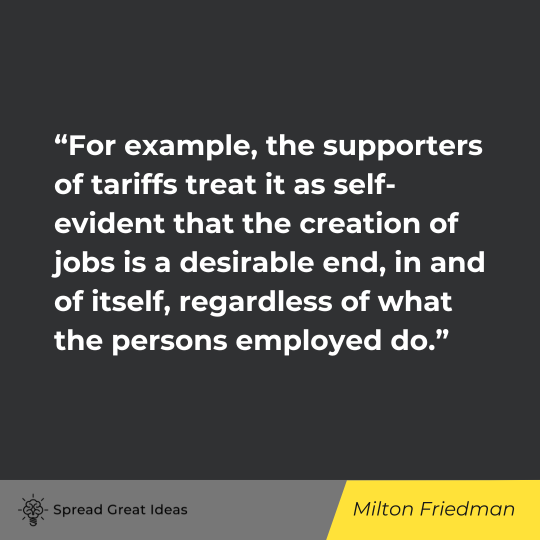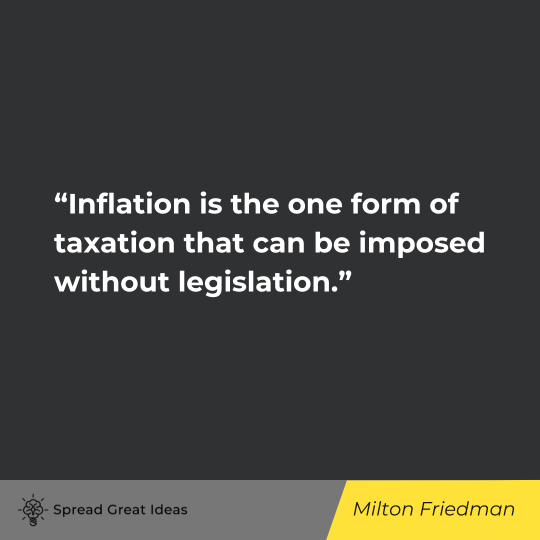Table of Contents
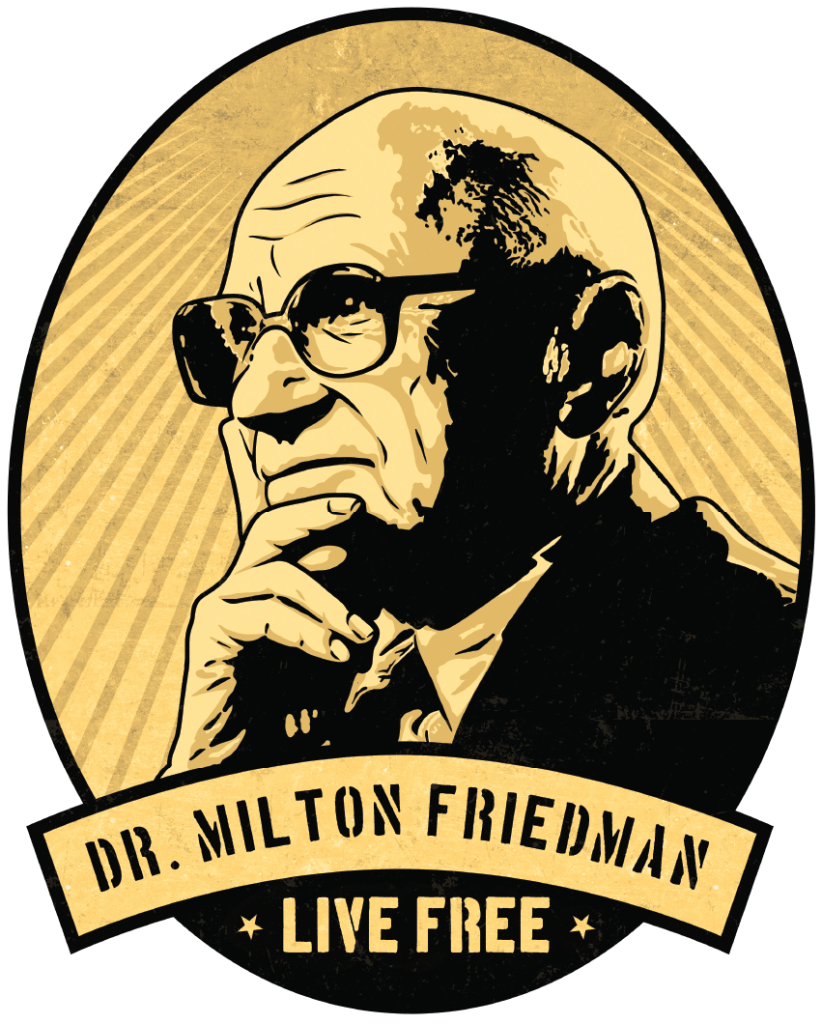
Hailed as the godfather of conservative libertarianism, Milton Friedman quotes openly attacked Keynesianism in an era when most economists widely accepted its fundamental premises.
Friedman won the 1976 Nobel Prize in Economic Sciences “for his achievements in the fields of consumption analysis, monetary history and theory and for his demonstration of the complexity of stabilization policy.” As a leader of the Chicago school of economics he taught several of the country’s future preeminent economists including Gary Becker, Robert Fogel, and Thomas Sowell.
Friedman was born to working class Jewish parents in Brooklyn in 1912. He studied economics at Rutgers University and then the University of Chicago, and upon graduating moved to Washington, D.C. to work as an economist for the Roosevelt administration.
Although Friedman approved of some aspects of the New Deal which he deemed suitable responses to the Great Depression, he opposed its regulation of both prices and wages. This opposition would color much of Friedman’s later stance on government intervention.
Friedman continued working for the government as a mathematical weapons statistician throughout the Second World War. When peace resumed he earned his doctorate from Columbia University and accepted a position at the University of Chicago where he would remain for 30 years. During his tenure Friedman wrote several influential books including A Theory of the Consumption Function and Capitalism and Freedom in which he laid out his groundbreaking theories.
Friedman developed the permanent income hypothesis, which holds that changes in a person’s permanent income – their expected long-term average income – predicts their consumption habits far more reliably then their current income could alone. This hypotheses was formative in helping economists predict how consumers would stabilize their spending, and furthermore a blatant contradiction to Keynesian theory.
Friedman coined the term “helicopter money” while illustrating the effects of monetary expansion, as well as introduced the concept of “natural rate of unemployment.” This theory, which won Friedman and Edmund Phelps their Nobel Prize, explains that inflation results from too low an unemployment rate. In effect Friedman predicted the concept of “stagflation,” or persistent high inflation combined with high unemployment and stagnant demand in a country’s economy, years before it was properly named. Friedman also popularized the theory of monetarism, which advocates for small, controlled expansions in the supply of money as part of responsible monetary policy. The Federal Reserve put this theory to work during the financial crisis of 2007-2008.
While he acknowledged the role of government in the monetary system, Friedman believed the Federal Reserve’s historically poor performance begged its replacement by a computer algorithm. He also advocated for floating exchange rates, the implementation of school choice and school vouchers, abolishing a system of conscription which he deemed inequitable and arbitrary, and the adoption of an anti-interventionist foreign policy.
Although a member of the Republican party who advised both Barry Goldwater and Ronald Reagan, Friedman always espoused libertarian philosophical principles. He was soundly in favor of legalizing drugs, prostitution, and homosexuality, and while he was also in favor of immigration for its economic benefits he opposed immigrants’ access to the welfare system.
Friedman worked right up until the age of 94. Like Charles Schultz, his final work appeared in newspapers the day following his death.
Milton Friedman Quotes on Greed
Milton Friedman Capitalism and Freedom Quotes
“A major source of objection to a free economy is precisely that it … gives people what they want instead of what a particular group thinks they ought to want. Underlying most arguments against the free market is a lack of belief in freedom itself.”
– Milton Friedman
“I think that nothing is so important for freedom as recognizing in the law each individual’s natural right to property, and giving individuals a sense that they own something that they’re responsible for, that they have control over, and that they can dispose of.”
– Milton Friedman
“A society that puts equality before freedom will get neither. A society that puts freedom before equality will get a high degree of both.”
– Milton Friedman
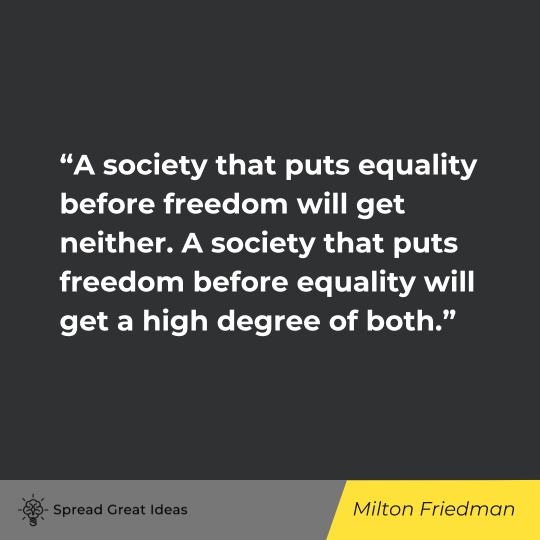
“The great virtue of a free market system is that it does not care what color people are; it does not care what their religion is; it only cares whether they can produce something you want to buy. It is the most effective system we have discovered to enable people who hate one another to deal with one another and help one another.”
– Milton Friedman
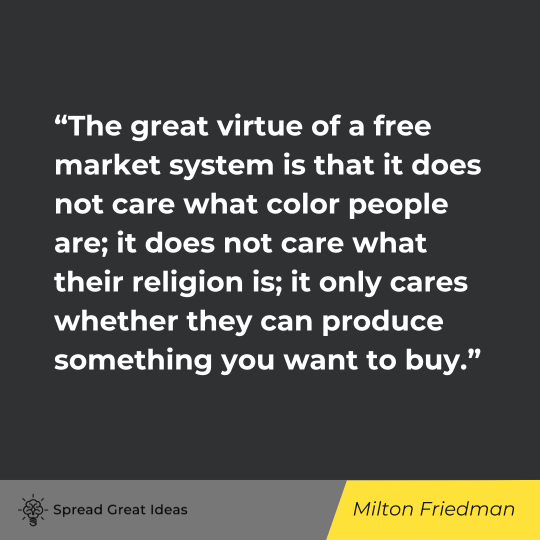
“When unions get higher wages for their members by restricting entry into an occupation, those higher wages are at the expense of other workers who find their opportunities reduced. When government pays its employees higher wages, those higher wages are at the expense of the taxpayer. But when workers get higher wages and better working conditions through the free market, when they get raises by firm competing with one another for the best workers, by workers competing with one another for the best jobs, those higher wages are at nobody’s expense.”
– Milton Friedman
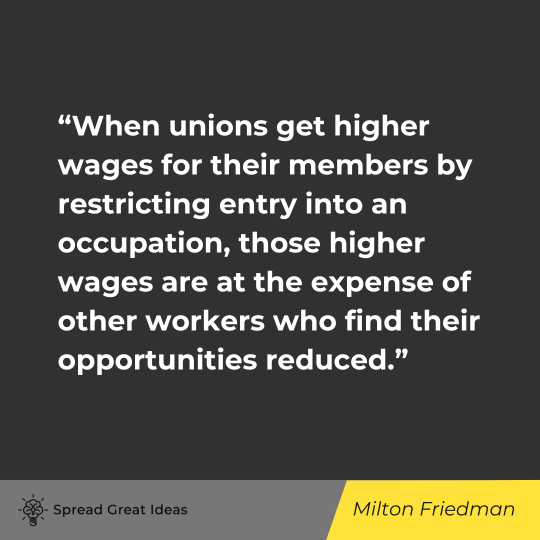
“For example, the supporters of tariffs treat it as self-evident that the creation of jobs is a desirable end, in and of itself, regardless of what the persons employed do. That is clearly wrong. If all we want are jobs, we can create any number–for example, have people dig holes and then fill them up again, or perform other useless tasks. Work is sometimes its own reward. Mostly, however, it is the price we pay to get the things we want. Our real objective is not just jobs but productive jobs–jobs that will mean more goods and services to consume.”
– Milton Friedman
Milton Friedman Famous Quotes
“One of the great mistakes is to judge policies and programs by their intentions rather than their results.”
– Milton Friedman
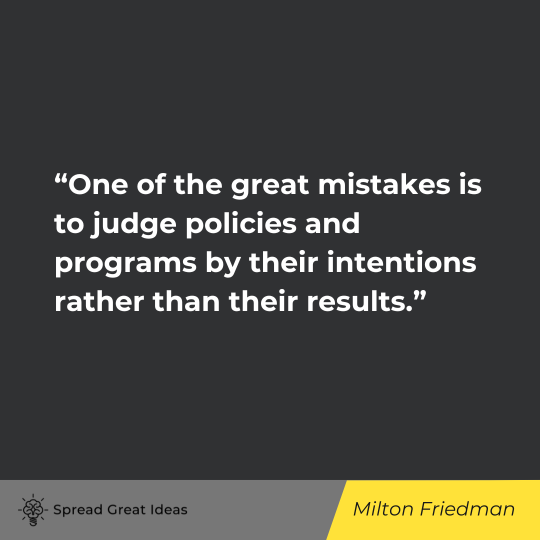
“Nothing is so permanent as a temporary government program.”
– Milton Friedman
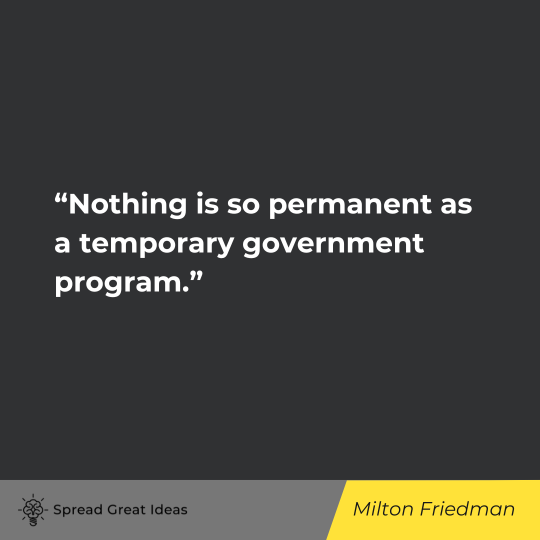
“Government has three primary functions. It should provide for military defense of the nation. It should enforce contracts between individuals. It should protect citizens from crimes against themselves or their property. When government– in pursuit of good intentions tries to rearrange the economy, legislate morality, or help special interests, the cost come in inefficiency, lack of motivation, and loss of freedom. Government should be a referee, not an active player.”
– Milton Friedman
“I am favor of cutting taxes under any circumstances and for any excuse, for any reason, whenever it’s possible.”
– Milton Friedman
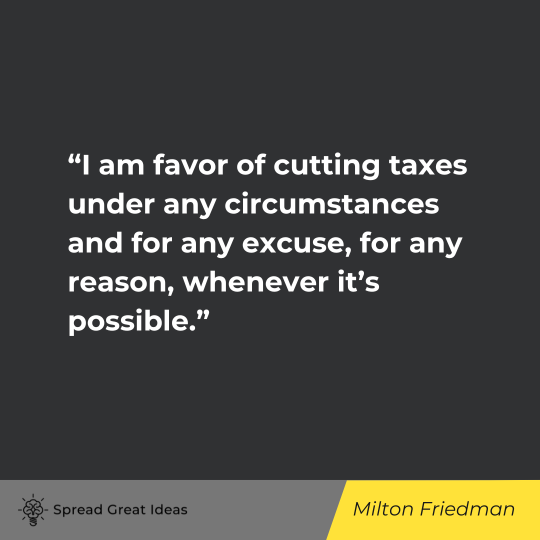
“Many people want the government to protect the consumer. A much more urgent problem is to protect the consumer from the government.”
– Milton Friedman
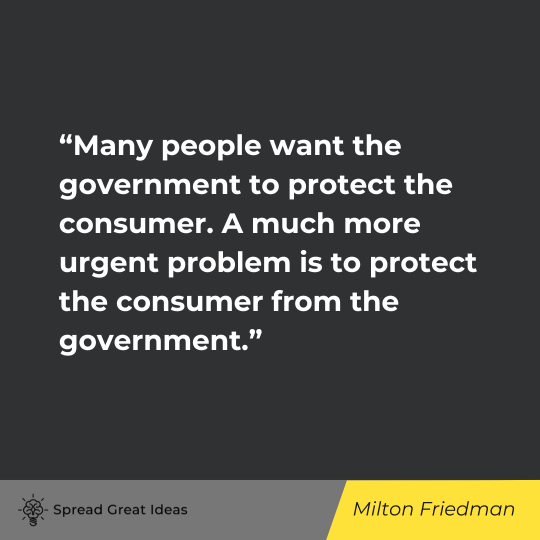
“See, if you look at the drug war from a purely economic point of view, the role of the government is to protect the drug cartel. That’s literally true.”
– Milton Friedman
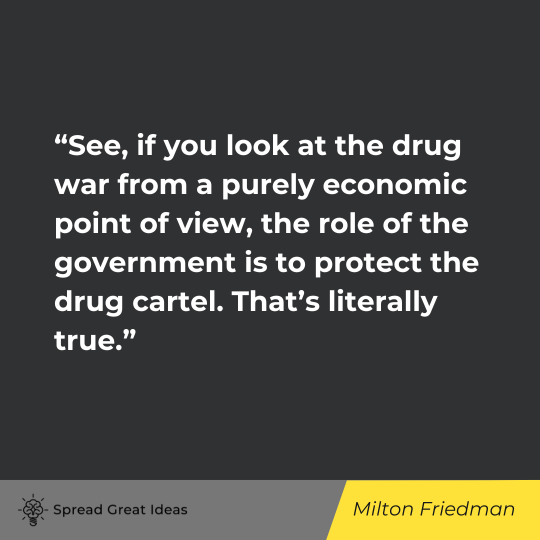
“Nobody spends somebody else’s money as carefully as he spends his own. Nobody uses somebody else’s resources as carefully as he uses his own. So if you want efficiency and effectiveness, if you want knowledge to be properly utilized, you have to do it through the means of private property.”
– Milton Friedman
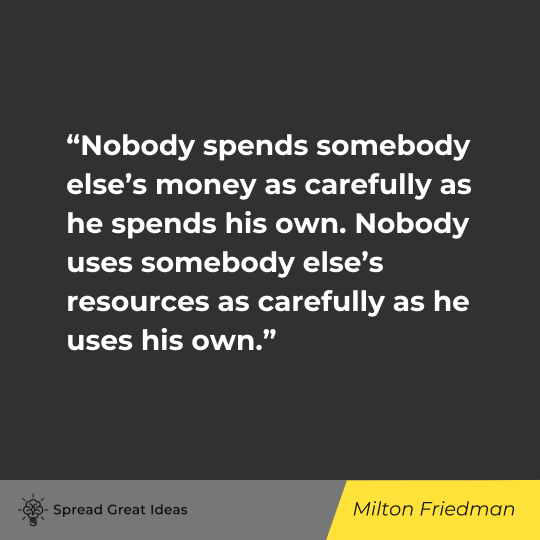
Milton Friedman Quotes Inflation
“Inflation is caused by too much money chasing after too few goods.”
– Milton Friedman
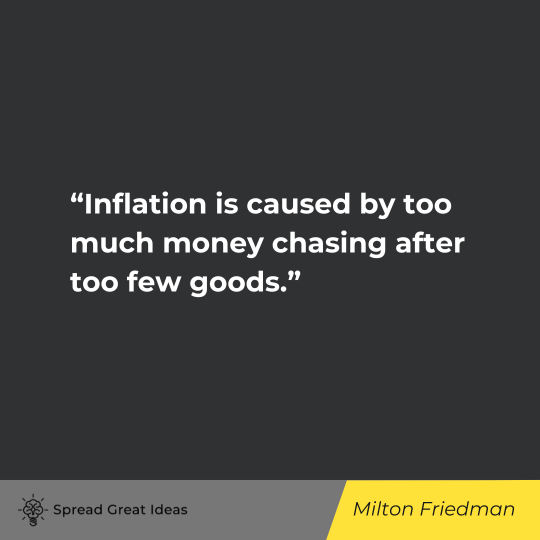
“Inflation is the one form of taxation that can be imposed without legislation.”
– Milton Friedman
Milton Friedman Quotes Social Responsibility
“There is one and only one social responsibility of business – to use its resources and engage in activities designed to increase its profits so long as it stays within the rules of the game, which is to say, engages in open and free competition without deception or fraud.”
– Milton Friedman
Milton Friedman Quotes on Socialism
“Believers in aristocracy and socialism share a faith in centralized rule, in rule by command rather than by voluntary cooperation.”
– Milton Friedman
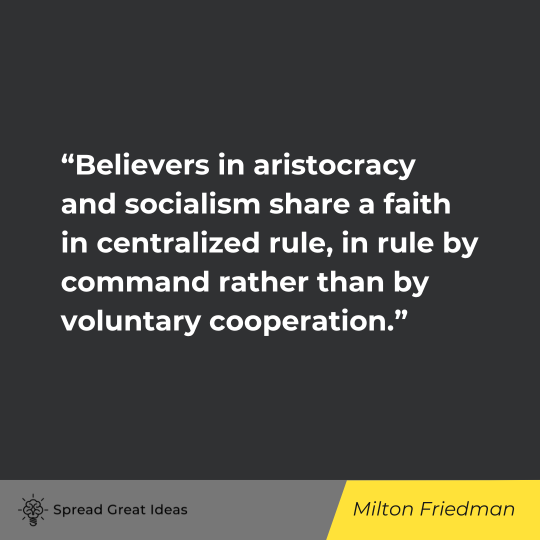
“After the fall of communism, everybody in the world agreed that socialism was a failure. Everybody in the world, more or less, agreed that capitalism was a success. And every capitalist country in the world apparently deduced from that what the West needed was more socialism.”
– Milton Friedman
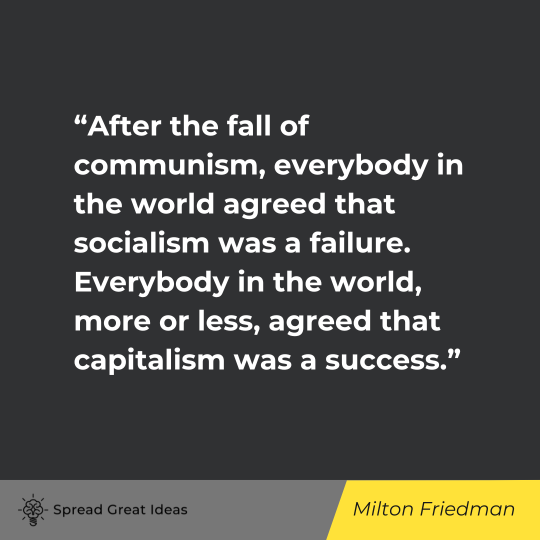
“It is widely believed that politics and economics are separate and largely unconnected; that individual freedom is a political problem and material welfare an economic problem; and that any kind of political arrangements can be combined with any kind of economic arrangements. The chief contemporary manifestation of this idea is the advocacy of ‘democratic socialism’ by many who condemn out of hand the restrictions on individual freedom imposed by ‘totalitarian socialism’ in Russia, and who are persuaded that it is possible for a country to adopt the essential features of Russian economic arrangements and yet to insure individual freedom through political arrangements. [My] thesis … is that such a view is a delusion, that there is an intimate connection between economics and politics, that only certain combinations of political and economic arrangements are possible, and that in particular, a society which is socialist cannot also be democratic, in the sense of guaranteeing individual freedom.”
– Milton Friedman
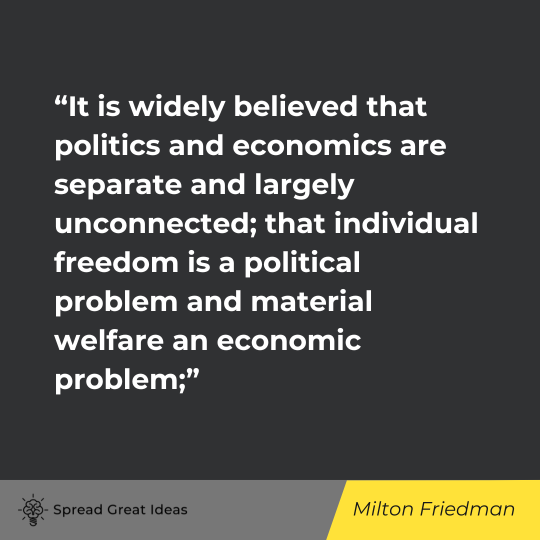
“[I]t is very hard to achieve good objectives through bad means. … [T]he [welfare] programs have a[n] insidious effect on the moral fiber of both the people who administer the programs and the people who are supposedly benefiting from it. For the people who administer it, it instills in them a feeling of almost Godlike power. For the people who are supposedly benefiting, it instills a feeling of childlike dependence. Their capacity for personal decision-making atrophies. The result is that the programs involved are a misuse of money. They do not achieve the objectives which it was their intention to achieve. But far more important than this, they tend to rot away the very fabric that holds a decent society together.”
– Milton Friedman
“The essential notion of a capitalist society is voluntary cooperation and voluntary exchange. The essential notion of a socialist society is fundamentally force. If the government is the master, you ultimately have to order people what to do. Whenever you try to do good with somebody else’s money, you are committed to using force. How can you do good with somebody else’s money unless you first take it away from them? The only way you can take it away from them is by threat of force. You have a policeman, a tax collector who comes to take it away from them. Whenever you use force, the bad moral value of force triumphs over good intentions.”
– Milton Friedman
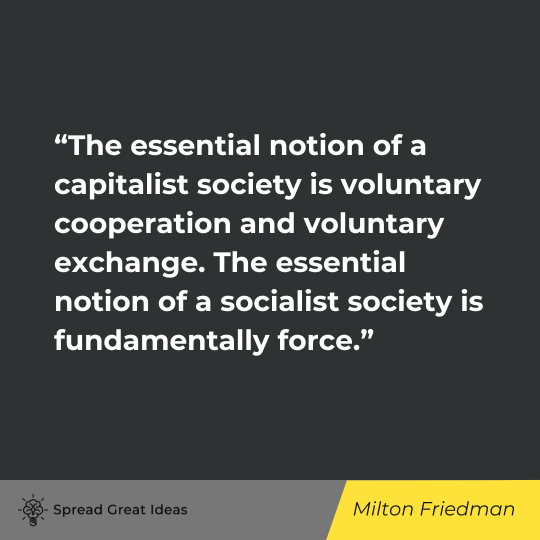
We hope you enjoyed this compilation of Milton Friedman quotes! Shoot us a message if you know of any we should add.
Libertarian
“The fact is, America is a country fundamentally shaped by libertarian values and attitudes. Our libertarian values helped to create the Constitution and the Bill of Rights, and those documents…
